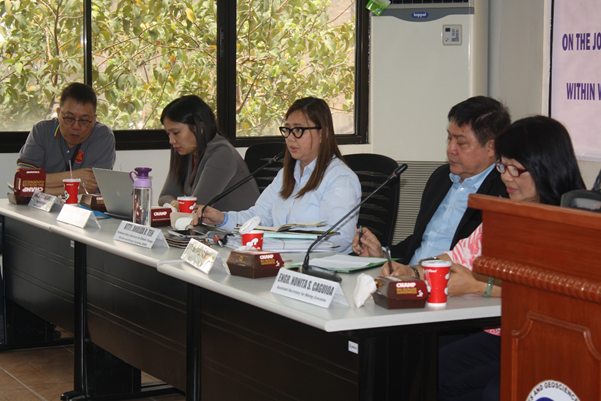With prevailing issues and concerns in the three lahar-clogged river systems – Bucao, Maloma, and Sto. Tomas – in Zambales Province, the Mines and Geosciences Bureau (MGB) organized a consultative meeting with stakeholders to ensure rigorous discussion and evaluation of the issuance of dredging clearance.
Representatives from MGB, Department of Environment and Natural Resources (DENR), Department of Public Works and Highways (DPWH) and other local and national government agencies, as well as, dredging operators from Zambales Province were present during the consultative meeting on the Joint Memorandum Circular (JMC) on the Guidelines on the Issuance of Clearance and/or Permit of Dredging. The said meeting was held at the Function Hall, 3/F Multipurpose Building, MGB Compound, North Avenue, Quezon City on April 5, 2019.
In his welcome remarks, MGB Director Atty. Wilfredo G. Moncano encouraged the participants to come up with suggestions on how to improve the proposed JMC. He said: “It is part of the due process under the law to hear inputs from stakeholders,” encouraging everyone to contribute in the said consultation.
Atty. Jilliane Joy M. Oria, Technical Assistant, Office of Undersecretary for Climate Change Service and Mining Concerns, DENR, presented the proposed JMC. She discussed the following salient points: a) coverage of the signed DENR Administrative Order (DAO) 2018-23, entitled, “Rationalization of Lahar Dredging, and Sand and Gravel Quarrying, Along Bucao, Maloma and Sto. Tomas in the Province of Zambales”; b) coverage of the draft DAO, entitled, “Providing Mechanisms for Lahar Disposition as a Result of DENR River Restoration through Dredging Activities in Bucao, Sto. Tomas and Maloma River Systems in the Province of Zambales,” and its Memorandum of Operating Agreement; c) requirements for acquiring a dredging clearance from DPWH; and d) environmental management program to mitigate impacts of dredging.
Various concerns were raised during the open forum, including the suspension of dredging operations, loss of revenue as a result of the former concern, and human health risk due to exposure to lahar. As a result of these concerns, commercial utilization of minerals and river restoration of the three river systems were also discussed.
During the discussion, Atty. Analiza Teh, Undersecretary for Climate Change Service and Mining Concerns, DENR, said that the current system, which requires dredging operators to send their dredging plans to DPWH, is not effective if we are aiming to restore the three river systems. However, under the proposed JMC, DPWH will be the one providing the dredging plan for operators working in the same river system. Dredging operators will only submit a work program in accordance to the dredging plan.
She also assured everyone that the government is one with the stakeholders in addressing their concerns, and to be successful, economic growth and environmental management must be in equilibrium. She urged everyone to cooperate in order to solve the pressing concerns being faced by the dredging industry.

From Left-Right: Regional Director Engr. Alilo Ensomo, Jr., MGB Regional Office No. III; Atty. Jilliane Joy M. Oria, Office of Undersecretary for Climate Change Service (CCS), DENR; Atty. Analiza R. Teh, Undersecretary for CCS, DENR; MGB Acting Director Atty. Wilfredo G. Moncano; and Engr. Nonita S. Caguioa, Assistant Secretary for Mining Concerns, DENR, during the question and answer portion.
By: Mineral Economics, Information and Publication Division
